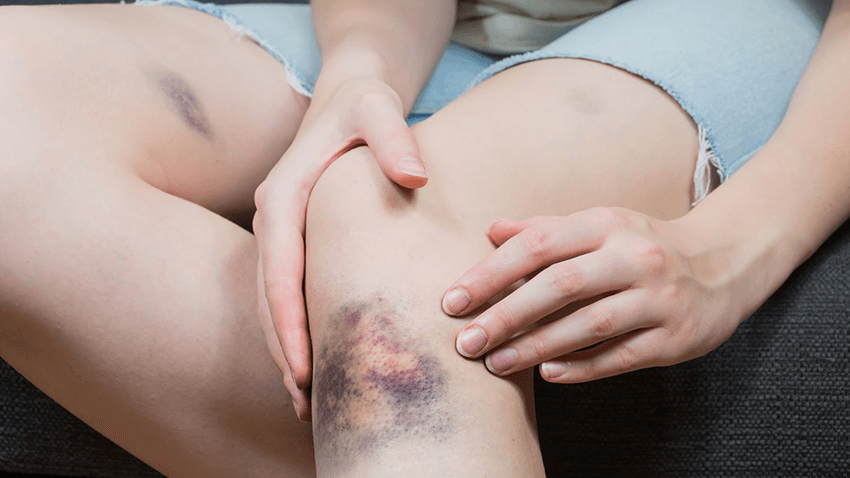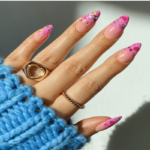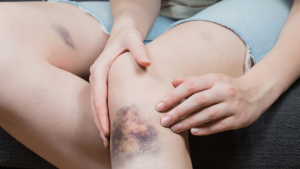
Everyone can find themselves in unexpected situations where a dark bruise emerges, a painful reminder etched on the body, much like an unwelcome and poignant memory. Undoubtedly, we’ve all been through those moments – be it a strenuous sports match, a minor mishap in daily life, or unforeseen circumstances that catch us off guard. Although, when the bruise appears, how can we erase it and confidently reclaim our lives? Let’s explore effective measures together to care for and fade those bruises, not only to alleviate pain and swelling but also to restore both your skin and spirit. Below is our detailed guide on how to overcome these not-so-easy bruises.
Signs of easy bruising
Some signs that an individual bruises more easily than other include:
- Bruising Frequency: If you experience bruising more frequently than normal or if your bruises appear without a clear cause, it could be a sign of bruising.
- Large or Painful Bruises: Unusually large or painful bruises may also be indicative of a tendency to bruise easily.
- Bruises in Unusual Places: Bruises appearing in unusual locations, such as the face, abdomen, or back, could also be a sign of bruising.
- Slow Healing Bruises: Bruises taking longer to heal than usual may also be a sign of bruising.
What Causes Easy Bruising?
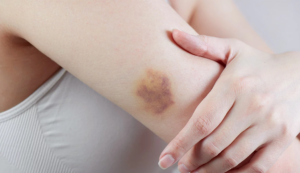
Bruising or a tendency to bruise easily, can be attributed to various factors. Here are common reasons why individuals may experience bruising:
- Genetics: Genetic predisposition plays a significant role. If there’s a family history of bruising, an individual may inherit a tendency to bruise more easily.
- Aging: As people age, their skin becomes thinner, and blood vessels lose some of their protective layers, making them more susceptible to bruising.
- Medications: Certain medications, such as blood thinners (anticoagulants), antiplatelet drugs, and some nonsteroidal anti-inflammatory drugs (NSAIDs), can interfere with the blood clotting process, leading to bruising.
- Vitamin Deficiencies: Insufficient levels of vitamins essential for blood clotting, particularly vitamin C and vitamin K, can contribute to bruising.
- Hormonal Changes: Fluctuations in hormones, often seen during menstruation, pregnancy, or menopause, can impact blood vessel integrity and contribute to bruising.
- Underlying Medical Conditions: Certain medical conditions, including bleeding disorders (e.g., hemophilia), liver disease, and autoimmune disorders, can cause bruising.
- Thrombocytopenia: A low platelet count, known as thrombocytopenia, can impair blood clotting and result in increased bruising.
- Trauma or Injury: Obviously, physical trauma or injury is a common cause of bruising. Individuals engaging in activities with a higher risk of injury may experience more frequent bruises.
- Sun Damage: Prolonged exposure to the sun can weaken the skin and blood vessels, making them more susceptible to bruising.
- Alcohol Abuse: Excessive alcohol consumption can interfere with the body’s ability to produce blood-clotting factors, leading to increased bruising.
Many people wonder “what causes a female to bruise easily?”. In fact, women often experience easier bruising than men due to several hormonal factors. Menstrual cycles can impact the strength and flexibility of blood vessels, making them more susceptible to injury and bruising. Thinner skin provides less protection for the blood vessels underneath, increasing the likelihood of bruising upon impact. Finally, body fat distribution, with women typically having more body fat, and the subcutaneous fat layer potentially offering less cushioning for blood vessels, may make them more prone to injury and bruising.
How to Get Rid Bruises – Advice for Patients
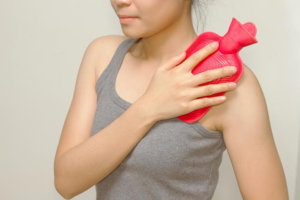
How to make bruises go away faster is a common inquiry for those seeking to expedite the healing process and minimize the visible aftermath of an injury. While bruises typically fade on their own over time, several strategies can help accelerate recovery.
- Soak a cloth bag in ice and apply it to the affected area in cold water for 15-20 minutes, several times a day, especially within the first 24-48 hours after injury. This helps reduce swelling and alleviate pain.
- Elevate the bruised area above the level of the heart if possible. This can minimize swelling and promote faster recovery.
- Apply arnica cream or gel to the bruised area several times a day. Arnica, an herbal remedy, is believed to have bruise-reducing properties.
- Avoid strenuous activities in the bruised area, as vigorous activities may worsen the bruising.
- Maintain a healthy diet rich in vitamins and minerals, which are essential for the blood clotting process and wound healing.
- Ensure adequate sleep. Sufficient sleep supports the body’s natural healing processes.
It may take approximately 1-2 weeks for it to completely disappear. No bruises disappear in hours. By incorporating these practices, you can actively contribute to minimizing the appearance and duration of bruises, providing a more rapid recovery.
When to contact a doctor
People should consult a doctor about bruising if:
- Bruising becomes more frequent or severe than previously experienced.
- Other symptoms, such as fever, fatigue, or alterations in skin appearance, accompany the bruising.
- The onset of easier bruising coincides with the introduction of medication.
- Healing of bruises is delayed.
- Observation of petechiae, which are small red spots resembling a rash beneath the skin.
- Formation of purpura, characterized by purple patches beneath the skin.
It is imperative to seek immediate emergency assistance if a substantial bruise emerges following trauma, particularly when accompanied by sensations of lightheadedness or dizziness. These symptoms may indicate potential internal bleeding, underscoring the urgency of obtaining prompt medical attention.
Conclusion
Understanding what helps with bruising is essential for individuals seeking effective strategies to expedite the healing process and minimize the impact of minor injuries. Employing remedies such as cold compresses, Arnica applications, and maintaining a diet rich in essential vitamins can significantly contribute to reducing both the discoloration and discomfort associated with bruises. It’s crucial to approach these remedies with patience, as bruises typically heal gradually over time. While these methods can offer relief for common bruises, any persistent concerns, severe pain, or uncertainty about the nature of the injury should prompt individuals to seek professional medical advice for a thorough evaluation and tailored recommendations. Overall, a combination of preventive measures, holistic approaches, and timely care can make a notable difference in the speed and effectiveness of bruise recovery.
FAQs
- Does anemia cause bruising?
Yes, anemia can cause bruising. Anemia is a condition where the body lacks enough healthy red blood cells. Red blood cells are responsible for transporting oxygen to tissues throughout the body. When there is anemia, tissues don’t receive an adequate oxygen supply, leading to the weakening of blood vessels. This makes blood vessels more prone to breaking and causing bruising.
- When should I be worried about bruising easily?
Easy bruising sometimes indicates a serious underlying condition, such as a blood clotting problem or a blood disease. See your health care provider if you: Have frequent, large bruises, especially if your bruises appear on your trunk, back, or face or seem to develop for no known reason
- What does leukemia bruising look like?
Leukemia bruising can appear similar to regular bruising, but it may also have some distinctive features. These include tiny red spots called petechiae, larger bruises that may appear more frequently or in unusual places, and clusters of bruises that give the skin a blotchy or rash-like appearance..
- Are certain medications associated with an increased risk of bruising?
Yes, certain medications can be associated with an increased risk of bruising. Some medications may affect blood clotting or the integrity of blood vessels, making individuals more prone to bruising.
- Can hormonal imbalances lead to increased susceptibility to bruising?
Yes, hormonal imbalances can contribute to an increased susceptibility to bruising. Hormones play a crucial role in maintaining the integrity of blood vessels and ensuring proper blood clotting. When there is an imbalance in hormone levels, particularly those involved in the clotting process, it can affect the body’s ability to respond to injuries and prevent excessive bleeding.

